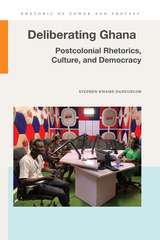
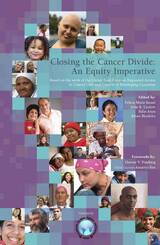
Cancer has become a leading cause of death and disability and a serious yet unforeseen challenge to health systems in low- and middle-income countries. A protracted and polarized cancer transition is under way and fuels a concentration of preventable risk, illness, suffering, impoverishment from ill health, and death among poor populations. Closing this cancer divide is an equity imperative. The world faces a huge, unperceived cost of failure to take action that requires an immediate and large-scale global response.
Closing the Cancer Divide presents strategies for innovation in delivery, pricing, procurement, finance, knowledge-building, and leadership that can be scaled up by applying a diagonal approach to health system strengthening. The chapters provide evidence-based recommendations for developing programs, local and global policy-making, and prioritizing research. The cases and frameworks provide a guide for developing responses to the challenge of cancer and other chronic illnesses. The book summarizes results of the Global Task Force on Expanding Access to Cancer Care and Control in Developing Countries, a collaboration among leaders from the global health and cancer care communities worldwide, originally convened by Harvard University. It includes contributions from civil society, global and national policy-makers, patients and practitioners, and academics representing an array of fields.
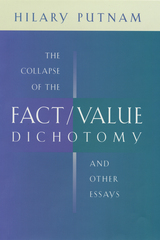
If philosophy has any business in the world, it is the clarification of our thinking and the clearing away of ideas that cloud the mind. In this book, one of the world's preeminent philosophers takes issue with an idea that has found an all-too-prominent place in popular culture and philosophical thought: the idea that while factual claims can be rationally established or refuted, claims about value are wholly subjective, not capable of being rationally argued for or against. Although it is on occasion important and useful to distinguish between factual claims and value judgments, the distinction becomes, Hilary Putnam argues, positively harmful when identified with a dichotomy between the objective and the purely "subjective."
Putnam explores the arguments that led so much of the analytic philosophy of language, metaphysics, and epistemology to become openly hostile to the idea that talk of value and human flourishing can be right or wrong, rational or irrational; and by which, following philosophy, social sciences such as economics have fallen victim to the bankrupt metaphysics of Logical Positivism. Tracing the problem back to Hume's conception of a "matter of fact" as well as to Kant's distinction between "analytic" and "synthetic" judgments, Putnam identifies a path forward in the work of Amartya Sen. Lively, concise, and wise, his book prepares the way for a renewed mutual fruition of philosophy and the social sciences.
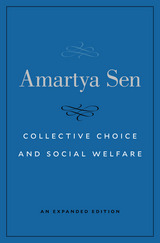
Originally published in 1970, this classic study has been recognized for its groundbreaking role in integrating economics and ethics, and for its influence in opening up new areas of research in social choice, including aggregative assessment. It has also had a large influence on international organizations, including the United Nations, notably in its work on human development. The book showed that the “impossibility theorems” in social choice theory—led by the pioneering work of Kenneth Arrow—do not negate the possibility of reasoned and democratic social choice.
Sen’s ideas about social choice, welfare economics, inequality, poverty, and human rights have continued to evolve since the book’s first appearance. This expanded edition preserves the text of the original while presenting eleven new chapters of fresh arguments and results.
“Expanding on the early work of Condorcet, Pareto, Arrow, and others, Sen provides rigorous mathematical argumentation on the merits of voting mechanisms…For those with graduate training, it will serve as a frequently consulted reference and a necessity on one’s book shelf.”
—J. F. O’Connell, Choice


Social justice: an ideal, forever beyond our grasp; or one of many practical possibilities? More than a matter of intellectual discourse, the idea of justice plays a real role in how—and how well—people live. And in this book the distinguished scholar Amartya Sen offers a powerful critique of the theory of social justice that, in its grip on social and political thinking, has long left practical realities far behind.
The transcendental theory of justice, the subject of Sen’s analysis, flourished in the Enlightenment and has proponents among some of the most distinguished philosophers of our day; it is concerned with identifying perfectly just social arrangements, defining the nature of the perfectly just society. The approach Sen favors, on the other hand, focuses on the comparative judgments of what is “more” or “less” just, and on the comparative merits of the different societies that actually emerge from certain institutions and social interactions.
At the heart of Sen’s argument is a respect for reasoned differences in our understanding of what a “just society” really is. People of different persuasions—for example, utilitarians, economic egalitarians, labor right theorists, no-nonsense libertarians—might each reasonably see a clear and straightforward resolution to questions of justice; and yet, these clear and straightforward resolutions would be completely different. In light of this, Sen argues for a comparative perspective on justice that can guide us in the choice between alternatives that we inevitably face.
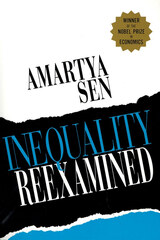
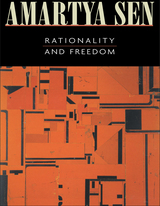
Rationality and freedom are among the most profound and contentious concepts in philosophy and the social sciences. In two volumes on rationality, freedom, and justice, the distinguished economist and philosopher Amartya Sen brings clarity and insight to these difficult issues. This volume--the first of the two--is principally concerned with rationality and freedom.
Sen scrutinizes and departs from the standard criteria of rationality, and shows how it can be seen in terms of subjecting one's values as well as choices to the demands of reason and critical scrutiny. This capacious approach is utilized to illuminate the demands of rationality in individual choice (including decisions under uncertainty) as well as social choice (including cost benefit analysis and environmental assessment).
Identifying a reciprocity in the relationship between rationality and freedom, Sen argues that freedom cannot be assessed independently of a person's reasoned preferences and valuations, just as rationality, in turn, requires freedom of thought. Sen uses the discipline of social choice theory (a subject he has helped to develop) to illuminate the demands of reason and the assessment of freedom. The latter is the subject matter of Sen's previously unpublished Arrow Lectures included here.
The essays in these volumes contribute to Sen's ongoing transformation of economic theory and social philosophy, and to our understanding of the connections among rationality, freedom, and social justice.

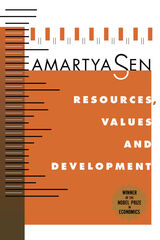
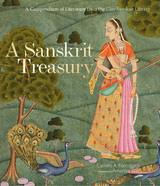
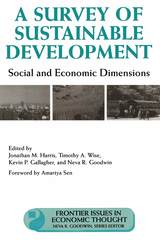
Perpetual economic growth is physically impossible on a planet with finite resources. Many concerned with humanity's future have focused on the concept of "sustainable development" as an alternative, as they seek means of achieving current economic and social goals without compromising the ability of future generations to meet their own goals. Sustainable development brings together elements of economics, public policy, sociology, ecology, resource management, and other related areas, and while the term has become quite popular, it is rarely defined, and even less often is it understood.
A Survey of Sustainable Development addresses that problem by bringing together in a single volume the most important works on sustainable human and economic development. It offers a broad overview of the subject, and gives the reader a quick and thorough guide to this highly diffuse topic. The volume offers ten sections on topics including:
- economic and social dimensions of sustainable development
- the North/South balance
- population and the demographic transition
- agriculture and renewable resources
- energy and materials use
- globalization and corporate responsibility
- local and national strategies
Each section is introduced with an essay by one of the volume editors that provides an overview of the subject and a summary of the mainstream literature, followed by two- to three-page abstracts of the most important articles or book chapters on the topic.
A Survey of Sustainable Development is the sixth and final volume in the Frontier Issues of Economic Thought series produced by the Global Development And Environment Institute at Tufts University. Each book brings together the most important articles and book chapters in a "frontier" area of economics where important new work is being done but has not yet been incorporated into the mainstream of economic study. The book is an essential reference for students and scholars concerned with economics, environmental studies, public policy and administration, international development, and a broad range of related fields.
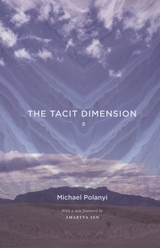
“I shall reconsider human knowledge by starting from the fact that we can know more than we can tell,” writes Michael Polanyi, whose work paved the way for the likes of Thomas Kuhn and Karl Popper. The Tacit Dimension argues that tacit knowledge—tradition, inherited practices, implied values, and prejudgments—is a crucial part of scientific knowledge. Back in print for a new generation of students and scholars, this volume challenges the assumption that skepticism, rather than established belief, lies at the heart of scientific discovery.
“Polanyi’s work deserves serious attention. . . . [This is a] compact presentation of some of the essentials of his thought.”—Review of Metaphysics
“Polanyi’s work is still relevant today and a closer examination of this theory that all knowledge has personal and tacit elements . . . can be used to support and refute a variety of widely held approaches to knowledge management.”—Electronic Journal of Knowledge
"The reissuing of this remarkable book give us a new opportunity to see how far-reaching—and foundational—Michael Polanyi's ideas are, on some of the age-old questions in philosophy."—Amartya Sen, from the new Foreword
READERS
Browse our collection.
PUBLISHERS
See BiblioVault's publisher services.
STUDENT SERVICES
Files for college accessibility offices.
UChicago Accessibility Resources
home | accessibility | search | about | contact us
BiblioVault ® 2001 - 2025
The University of Chicago Press


